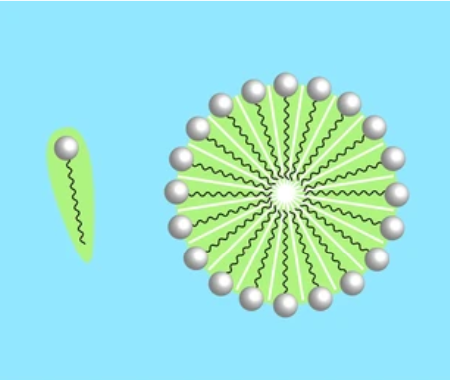Myth No. 19 - Use of surfactants in your daily cleansing regime
As a new mom, one of the immediate advice I was given before I left the hospital was not to bathe my newborn on a daily basis. Because newborn skin is still so new and sensitive to the external environment, excessive bathing will dry out the skin. Cleansing with water alone is enough to dry out delicate baby skin that is five times thinner than that of adults (we'll tackle this topic another day and I promise I'll come back to link it!). The additional use surfactants during bath time will only further strip the skin of its natural oils. The same logic also extends to kids or adults with dry or sensitive skin.
But let’s take a few steps back, what are “surfactants” and how do they clean the skin?
The word "surfactant" is shortened from the term "surface active agent". Imagine a surfactant molecule like a bi-polar tadpole, with a head and a tail. The head loves water ("hydrophilic") and the tail hates water ("hydrophobic"). When a surfactant touches a surface, the heads naturally look to attach themselves to water molecules, while the tails hide away to protect themselves from them, and end up forming something called a "micelle" that looks like the picture on the right below:

When you wash with surfactants, the tails will attach themselves to the non-water components of the soiled particles and remove them from your skin surface to create the cleansing effect. Many people have the misconception that you must wash off the soap suds residue to be clean; while this is technically true, you're actually washing off the soiled particles encased in the soap micelles, the soap isn't what's keeping your dirty.
Now back to our mythbusting. The top-most layer of your skin (called "stratum corneum") is protected by a lipid barrier made of free fatty acids, cholesterol, and ceramides. This barrier prevents transepidermal water loss (aka "TEWL") and protects you from external pathogens and chemicals that can damage your skin health. Sensitive or irritated skin is the result of a poorly functioning lipid barrier. This is why overcleansing with surfactants will further strip the skin of this natural barrier of oils and exacerbate existing skin concerns.
A case in point:
Over the weekend, a customer mentioned her elderly mother suffers from an irritated skin patch on her arm and is looking for gentle cleansing solution for the area in her skin. So I asked her if she felt the area actually needed daily deep cleaning (I use the term “deep clean” to differentiate the practice from simply washing the area with water and maybe a gentle scrub for mild exfoliation purposes). The question took her by surprise and she had to pause for a moment to think before responding "no". And I think that’s the moral of the story: ask ourselves the question when we are dealing with sensitive skin: "Do we actually need to deep clean it every day?"
